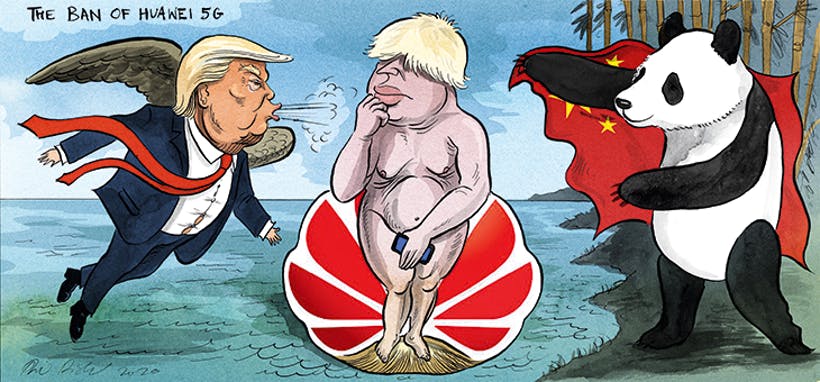Home
Using a Parker fountain pen (a brand now made in Nantes), Boris Johnson, the Prime Minister, signed the EU withdrawal agreement, which had been signed by Charles Michel, the President of the European Council, and Ursula von der Leyen, the President of the European Commission, in Brussels and sent to London by train. The Queen had given royal assent to the Withdrawal Bill. All that remained was for the agreement to be rubber-stamped by the European Parliament to allow the United Kingdom to leave the European Union at 11 p.m. GMT on 31 January. A 50p coin was minted, inscribed: ‘Peace, prosperity and friendship with all nations’; Lord Adonis declared: ‘I am never using or accepting this coin.’ Professor Selina Todd, a historian at St Hilda’s College, Oxford, was given protection at lectures because of threats by transgender campaigners who disapproved of her academic findings.
The government decided to allow the Chinese company Huawei a part in developing 5G wireless technology for mobile networks, but to be banned from supplying equipment to ‘sensitive parts’ and from working in areas near military bases and nuclear sites. In a telephone conversation with President Donald Trump of the United States, Boris Johnson said Britain would work with America to ‘break the dominance’ of companies like Huawei.
No one had taken account of how complex and risky the HS2 high-speed rail project might be, the National Audit Office said. Leaked information from the review by Doug Oakervee had put the likely cost at £106 billion. In the past five years, 38 people have been killed on so-called smart motorways, with no hard shoulder, a Freedom of Information request informed Panorama, the BBC television programme.
Rolls-Royce said it could manufacture small nuclear energy reactors, each occupying 1.5 acres, for sites in England and Wales by 2029. Seamus Mallon, of the SDLP, who in 1998 served as deputy first minister to David Trimble in the new Northern Ireland Assembly, died, aged 83. Gary Webb, from Gatehouse of Fleet in Dumfries and Galloway, was awarded £100,000 compensation after he was imprisoned for four days following his arrest by detectives who had a warrant for a different man. Broadcaster Nicholas Parsons, who appeared in Much-Binding-in-the-Marsh and for 50 years was the chairman of Just a Minute, died, aged 96. England won the Test series in South Africa 3-1.
Abroad
The Wuhan coronavirus had killed 56 people by the beginning of the week; the next day the total dead rose to 81, to 106 the next and 132 the next. The virus was found to have an incubation period of up to 14 days, during which it could be passed to other people. Wuhan itself was blockaded by the Chinese authorities and public transport closed in other cities. The Foreign Office had advised British people to leave Hubei province if they could. In Italy, Matteo Salvini of the right-wing League failed to oust the left-wing Stefano Bonaccini as governor of Emilia-Romagna.
Donald Trump put forward a plan for the Middle East envisaging both a Palestinian state and the recognition of Israeli sovereignty over West Bank settlements; President Mahmoud Abbas of the Palestinian authority rejected it. The Prince of Wales visited the tomb of his grandmother Princess Alice, the mother of the Duke of Edinburgh, at the church of St Mary Magdalene in Jerusalem. He also addressed the World Holocaust Forum and visited Bethlehem. In North Korea, Kim Jong-un’s aunt Kim Kyong-hui, not seen for six years since her husband was executed, appeared with her nephew sitting on a red seat with a lacy antimacassar, applauding a New Year entertainment. Japanese police found 24,000 letters at the home of a postman in Kanagawa, near Tokyo, undelivered since 2003.
Iran hanged a drug-smuggler said to have been caught with 100 tons of drugs in international waters; it refused to name him except by the nickname Crocodile of Persian Gulf. Islamist militants on motorbikes killed 20 soldiers at a camp at Sokolo, Mali. At least 36 people were killed by an earthquake in the Elazig province of eastern Turkey. Canadians sent six freight planes full of knitted mittens and suchlike goods to Australia for koalas affected by wildfires, but local volunteers found themselves unable to cope with the volume of handicrafts. CSH






Comments